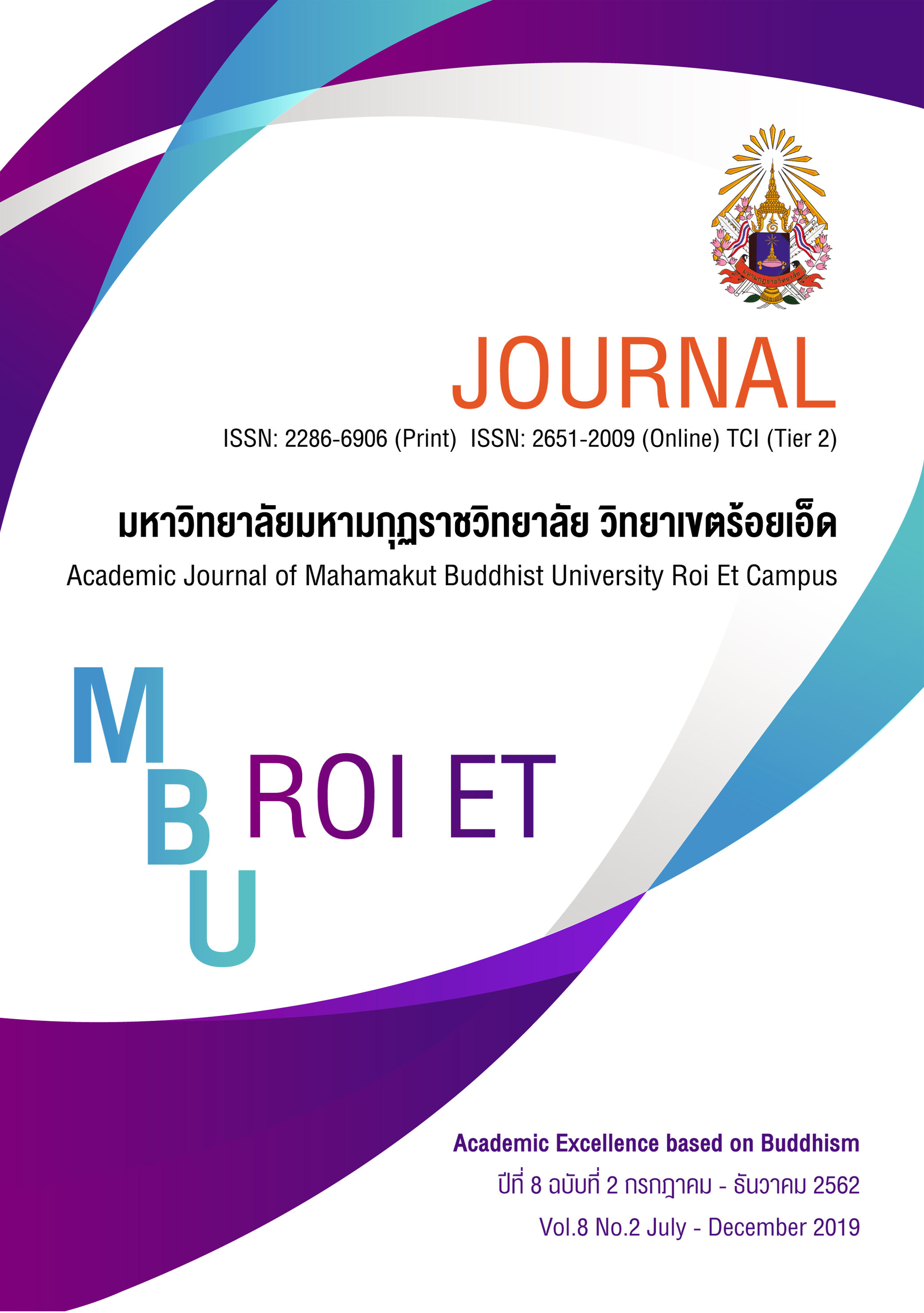Learning Management Based The Threefold Training for the Learner Development in The Learning Area of Good Citizens Culture and Life Style in The Society for Chumchonchum Phae School Students Khon Kaen Province
Main Article Content
Abstract
The aims of this research were: to study the states of the learning management based on the Threefold Learning (tisikkhā) for the learner development in the learning area of civics, culture and living in society for Chumchon Chum Phae school students in KhonKaen; to study the suggestions and ways to develop the learning management based on the Threefold Learning that is suitable for the social contexts of the learners and teachers. The samples of this research included 205 students of Chumchon Chum Phae School. The statistics used in data analysis were: Frequency distribution, Mean and Standard Deviation. In cases in which differences were found at a statistically significant level, Scheffe’s method of paired comparison was utilized. The obtained data were interpreted by the descriptive analysis.
The research results were as follows:
The mean score of the learning management based on the Threefold Learning (tisikkhā) for the learner development in the learning area of civics, culture and living in society for Chumchon Chum Phae school students in KhonKaen was rated at a high level When considered in each aspect, the highest score can be seen in that of ‘Importance of being a good citizen’, followed by ‘Right, duty and freedom in living ‘Differences and diversity of cultures’ and ‘Value and faith All studied aspects were rated at the same level. The suggestions and ways to develop the learning management based on the Threefold Learning that is suitable for the social contexts of the learners and teachers are that the instructors should suggest guidelines for compliance with roles and duties as good members of the family, community, society, school, respecting laws and complying with rules and social regulations; the instructors should guide the practice that allows the students to be able to live with groups in a society with cultural differences, diverse beliefs and should suggest a way for students to live in a normal society by respecting the rights of others and being able to make decisions and solve problems that occur within society with peace and harmony.
Article Details
References
ชินธันย์ จิตต์การุณย์. (2550). การศึกษารูปแบบการนิเทศการเรียนการสอนแบบเพื่อนนิเทศเพื่อนในการเรียนการสอนกลุ่มสาระสังคมศึกษาศาสนาและวัฒนธรรม. วิทยานิพนธ์ปริญญาศึกษาศาสตรมหาบัณฑิต. บัณฑิตวิทยาลัย : มหาวิทยาลัยศิลปากร.
สำราญ วงศ์คำพันธ์. (2556). กระบวนการสอนตามหลักไตรสิกขา ในโรงเรียนไมตรีจิตไทย – อเมริกัน. วิทยานิพนธ์ปริญญาพุทธศาสตรมหาบัณฑิต. บัณฑิตวิทยาลัย : มหาวิทยาลัยจุฬาลงกรณราชวิทยาลัย.
สิริวรรณ ศรีพหล. (2548). การพัฒนาจิตสำนึกความเป็นพลโลก สำหรับเยาวชนตามแนวพุทธธรรม. นนทบุรี : สถาบันวิจัยและพัฒนา มหาวิทยาลัยสุโขทัยธรรมาธิราช.
สิริวรรณ ศรีพหล. (2557). การพัฒนาชุดฝึกอบรมทางไกล เรื่องการจัดการเรียนการสอน กลุ่มสาระการเรียนรู้สังคมศึกษา ศาสนาและวัฒนธรรม สำหรับครูที่สอนในระดับมัธยมศึกษาของโรงเรียนขยายโอกาส. รายงานการวิจัย. มหาวิทยาลัยสุโขทัยธรรมาธิราช.
อัมพวัน สองสมุทร. (2547). การพัฒนากิจกรรมการเรียนรู้เรื่อง สิทธิมนุษยชน กลุ่มสาระการเรียนรู้คมศึกษา ศาสนาและวัฒนธรรม ในช่วงชั้นที่ 3. วิทยานิพนธ์ครุศาสตรมหาบัณฑิต. จุฬาลงกรณ์มหาวิทยาลัย.


